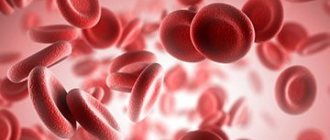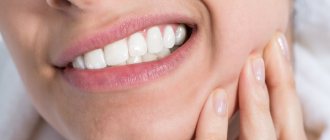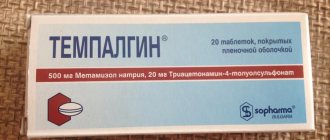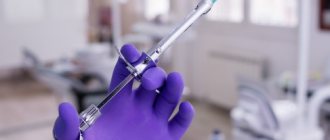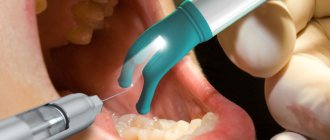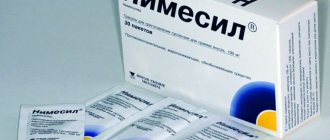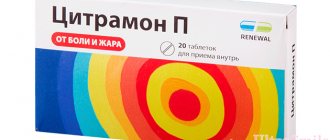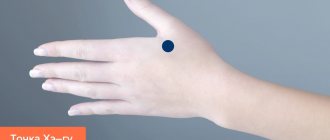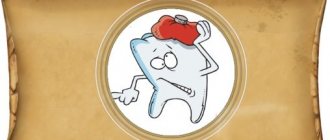Toothache can disable you at any inopportune moment. And the variety of modern analgesics confronts the patient with a difficult choice. You can regularly find the analgesic Pentalgin in colorful packaging on pharmacy shelves. The drug comes in two types, one of which is available for free sale, the second is sold strictly according to a prescription. What is the difference between them, and which is better? Is it worth choosing this drug at all? Will Pentalgin help with toothache when there are several painful days left before a visit to the dentist?
Addiction
Codeine is widely used in pharmaceuticals, but it is derived from morphine, which means it is a narcotic substance that can cause addiction in humans.
It is no coincidence that the State Drug Control Service excluded codeine-containing drugs from free sale. The reason was the increase in the number of drug addicts who gained easy access to the drug. It was enough to buy several packs of “effective” cough or migraine tablets - and a new dose was received.
The presence of Codeine in Pentalgin causes drug addiction
Drug addicts not only used medications to obtain codeine synthetically. They swallowed pills in packs, after which the body received such toxic shocks that many organs began to fail. Therefore, now drugs with codeine can only be obtained with a doctor’s prescription and only in the amount specified by the doctor.
Codeine affects the brain, causing the body to relax, and also actively suppresses the cough reflex in humans - many drugs with codeine are created specifically for the treatment of severe cough. But it also helps with pain. Already half an hour after taking the pill, the patient can breathe a sigh of relief.
But once you take the pills for about a week, the body itself will begin to reach for a calm, measured state without pain symptoms. Addiction develops, and soon one tablet will no longer be enough to get complete help. The patient will begin to increase the dosage and become dependent on codeine. And it is very difficult to wean yourself off the “narcotic” Pentalgin: sleep is disturbed, waves of acute pain permeate the whole body, the oral mucosa dries out, the mood becomes aggressive and nervous. This is a real “withdrawal”.
Interaction with other tools
An adult must know a simple truth: mixing any medications is unacceptable! The body will be poisoned because the liver cannot cope with so many toxins. While one medicine inhibits the liver, the second poisons it.
Alcohol and antidepressants used together with Pentalgin attack the liver, leading to the development of pancreatitis
Barbiturates, as well as antidepressants with tricyclic action and alcohol are the most important enemies of the liver, which begin to poison it if they are treated together with Pentalgin.
If anticoagulants (blood thinning medications) are taken simultaneously with Pentalgin, paracetamol will enhance their effect and there will be a risk of internal bleeding.
It is especially dangerous to take alcohol together with Pentalgin, which contains paracetamol, as pancreatitis may develop.
Even drinks containing coffee should not be taken during treatment with Pentalgin. As mentioned above, it contains caffeine, and therefore there is a high risk of overstimulating the central nervous system and causing sleep disorders.
Sleeping pills, on the contrary, will enhance their effect, but this does not mean that if you have poor sleep, they should be taken with Pentalgin. We must not forget about the intoxication of liver cells.
Adverse reactions and overdose
While taking the drug, negative reactions may appear in the form of allergies, problems with the nervous and digestive systems, and disruption of the cardiovascular system. The following symptoms are typical for such conditions: skin rash, hives, feelings of excitement and anxiety, disturbed sleep, rapid heart rate, high blood pressure, nausea, vomiting, upset stomach, dizziness.
If you use tablets in large quantities for a long time, an overdose may occur. It is manifested by the following symptoms: pale skin, anorexia, pain in the abdomen, vomiting, nausea, nervous and restless state, confused thinking, rapid pulse, pain in the head.
In rare cases, more serious symptoms and problems may occur: arrhythmia, pancreatitis, death.
If undesirable reactions occur, you should immediately rinse the stomach, take activated charcoal, and begin symptomatic treatment.
When a nagging toothache is not related to dentistry
Aching toothache can “masquerade” as trigeminal neuralgia
Toothache can also be caused by diseases of other organs:
- Otitis is an inflammation of the middle ear, which causes severe aching pain in the tooth, while the pain radiates to the teeth of the upper jaw from the side of the inflammation. With otitis media, not only the teeth hurt, but also the ear.
- Sinusitis is an inflammation of the maxillary sinuses located close to the roots of the teeth of the upper jaw. A sign of such a pathology may be increased pain when tilting the head.
- Angina pectoris - can cause aching pain in the teeth of the lower jaw on the left side. A distinctive sign is pain in the left arm and under the shoulder blade.
- Migraine-like headache - may be accompanied by aching pain in the teeth of the upper jaw. It can be distinguished from true toothache by the unpleasant sensations in the eye sockets.
After examining and diagnosing the disease, our dentists will refer the patient to a specialized doctor.
special instructions
Shelf life – 24 months. Should be kept in a dark and dry place at room temperature.
The drug has a number of proven analogues. These include: Ibuprofen, Amizon, Paracetamol. Before making a replacement, you need to consult a specialist.
Concomitant use of the drug with other drugs that contain paracetamol and NSAIDs is not allowed.
If the patient takes the medicine for more than a week, then it is necessary to monitor the value of peripheral blood and liver function.
Since caffeine is present in the composition, it can affect the nervous system, having an stimulating or, on the contrary, inhibitory effect.
How Pentalgin works for migraines
Migraines interfere with a person's ability to cope with everyday activities. It appears as a result of narrowing and dilation of blood vessels, which causes ischemia of brain tissue. Pentalgin is able to suppress pain in unbearable headaches. The drug has a rapid analgesic effect due to the presence of paracetamol in the composition. The effect lasts for a long time. The caffeine content helps dilate blood vessels.
On a note! If you have frequent migraines, it is best to consult a doctor.
A new drug with an old name
I tried to find a way out of the situation. It expanded its pharmaceutical line and provided patients with a solution in the form of the new Pentalgin, which does not contain codeine and at the same time is a very effective analgesic. The tablets still contain 5 components, but no longer related to narcotics:
- Paracetamol is an analgesic that reduces fever
- Naproxen - a remedy for inflammation and pain
- Caffeine is an assistant for migraines, a “supplier” of energy to the body, due to which analgesics are perceived better and therefore act more effectively.
- Drotaverine is an antispasmodic that relieves pain in the gastrointestinal tract, blood vessels and genitourinary system
- Pheniramine maleate is an analgesic that enhances the beneficial effects of naproxen and paracetamol.
New Pentalgin has a complex effect on the body, reducing the sensation of pain and restoring the desire to live. In this case, the patient does not have the risk of falling into the trap of dependence on the drug.
Pentalgin without codeine is very versatile and is used for different types of pain. However, it should be noted that the absence of this component does not allow the use of tablets with the same effectiveness as previously for acute pain.
New Pentalgin without Codeine can be purchased at a pharmacy without a prescription
If the gums in the mouth are just inflamed, or the sensitivity of the teeth is increased, the new Pentalgin is more likely to have the necessary effect. But if a person has periodontitis or deep carious cavities, under which the irritated pulp suffers, then it is unlikely that the new Pentalgin will be able to effectively block the pain. The patient will receive some relief, but nothing more.
Attention! Any analgesic, even with codeine in its composition, is not a treatment for a dental disease, but only the elimination of a painful symptom of pain that subsides for a short time. As a rule, suppressed symptoms drive the disease “behind the scenes”, from where it returns with renewed vigor and “finishes off” its sufferer. Dental problems will not go away on their own. And the dentist’s intervention should take place as soon as possible.
Causes of aching pain in a tooth
Toothache is a symptom that signals that a pathological process is occurring in the dentin with pulp, periosteum or gums. There may be several reasons for its occurrence:
- Pulpitis is an inflammation of the soft tissues of the tooth, consisting of a vascular bundle and a nerve. Aching pain appears with advanced, chronic pulpitis, which can spread to adjacent tissues.
- Periodontitis is an inflammation of the ligaments that support the tooth, develops as a complication of periodontal disease and is accompanied by inflammation of the gums.
- Periodontitis is an inflammation of the bone tissue surrounding the tooth.
- Eruption of a wisdom tooth - aching pain occurs at the site of the eruption of the tooth.
Pain in the teeth can be of non-odontogenic origin when other diseases are disguised as it. With otitis and sinusitis, especially purulent, severe aching pain spreads to the teeth on the affected side. It can be caused by diseases of the digestive tract and even angina pectoris.
How Pentalgin helps with muscle pain
After physical exertion, injury and as a result of inflammatory processes, muscle pain may appear. Pentalgin will also help cope with such pain. The tablets help eliminate inflammation, relieve pain and swelling. The analgesic effect lasts for a long time. Thanks to a well-chosen composition, the drug can influence several mechanisms of pain at once. In addition, the tablets have an antipyretic effect and therefore help with high body temperature.
Contraindications
The drug has a large list of contraindications that you should familiarize yourself with before taking it:
- stomach ulcer;
- hemorrhages of the gastrointestinal tract;
- individual susceptibility to the constituent components;
- bronchial asthma;
- kidney and liver diseases in severe form;
- hyperkalemia;
- diseases of the heart and blood vessels;
- persons under 18 years of age;
- period of childbearing and breastfeeding.
If pain of any origin appears, you should initially consult with a specialist who can prescribe the correct treatment.
There are some conditions in which the use of the medication is possible with great caution: high blood sugar, viral hepatitis, epilepsy, elderly patients.
